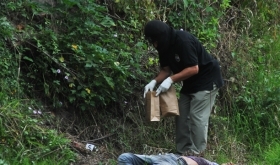Five soldiers have been murdered so far this year in El Salvador, lending credence to the claims of federal police that local “maras,” or street gangs, are plotting against the security forces.
On Monday, unknown assailants gunned down military reservist Juan Antonio Lainez Rodriguez in the small town of San Francisco El Dorado, located in the north central Cabañas province. While members of El Salvador’s National Civil Police (PNC) believe Lainez may simply have fallen victim to a robbery, they have not ruled out that his death may be part of a larger assault on the Salvadoran military and police by the country’s street gangs.
According to PNC investigators working the case, the number of bullet wounds he suffered (six, two in the face and four in the abdomen and legs) lends weight to this theory, suggesting that Lainez’s attackers may have singled him out for more than his valuables. “We know that the gangs have plans to kill soldiers, police and security guards, and plan on investigating this lead further,” one of the investigators told La Prensa Grafica.
Lainez Rodriguez’s death is the fifth such murder of a soldier in 2012, and the second this month. On February 6, army corporal Jose Lorenzo Ramos was murdered in the western province of La Libertad, believed to have been shot dead by two gunmen riding a motorcycle. Two corporals and a sergeant were killed in two separate incidents in January.
InSight Crime Analysis
As InSight Crime reported, PNC deputy director Howard Cotto told local media in January that jailed leaders of the country’s maras are planning an all-out attack on “the system.” According to Cotto, police have intercepted messages from these gang bosses in which they instruct their lieutenants to target members of the security forces, including police, soldiers, judges and prosecutors.
Given President Mauricio Funes push for a “more forceful” approach to the gang problem, with his recent shift towards a more militarized security strategy, such a plan could be seen as a kind of counteroffensive by the country’s main gangs.
It is unclear, however, whether Salvadoran gangs like the Mara Salvatrucha (MS-13) and Barrio 18 have the nationwide organization to carry out such coordinated actions. Because of this, InSight Crime expressed skepticism over Cotto’s warning, arguing that it had more to do with the politics of police reform, and was part of an attempt to portray the notoriously corrupt Salvadoran police as the “good guys.”
Ultimately, only time will tell if El Salvador’s maras are in fact waging war on the country’s security forces. While the five killings are alarming, they do not yet constitute a pattern. If more killings take place in the coming months, however, it could indicate that the country’s gangs have reached a new level of organization.

